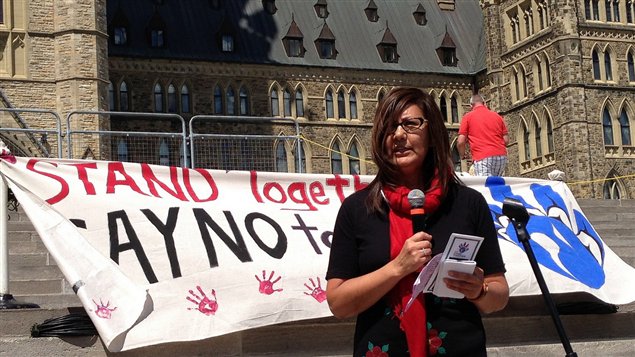Brenda Sayers has never been to eastern Canada before, but her fight on behalf of her First Nation, the Hupacasath of Vancouver Island, against the China-Canada trade agreement, paved the way.
The Canada-China Foreign Investment Promotion and Protection Agreement (FIPA) is the trade agreement Prime Minister Stephen Harper signed last September in Russia, with then Chinese President Hu Jintao. The two leaders were in Russia at the time for the APEC summit. The agreement has yet to be ratified by the Canadian Parliament.
The deal will have far-reaching effects in Canada. It will alter the ability of Canadians to decide on the best interests of the country in areas of resource management for example. If a group of Canadians oppose the interests of a Chinese company, there is an “investor state arbitration clause” that allows China to sue Canada on the grounds of interfering with their ability to make a profit. The dispute will then be decided by a secret 3-member tribunal. The agreement will be in force for 31 years.
Brenda Sayers says the FIPA “removes power from the provinces, it removes power from the municipalities to make laws that would protect their citizens.”
There has been little or no discussion of it in parliament or the mainstream media. This is why Brenda Sayers has been speaking to other First Nations and Canadians in eastern Canada this week, with the help of the advocacy group, The Council of Canadians.
Brenda Sayers became aware of the Canada-China agreement last October, and soon became the portfolio holder for the Canada China FIPA court challenge on behalf of the Hupacasath people. She says, however, the challenge is on behalf of all Canadians.
In Vancouver, in early June, Brenda Sayers was in court with the band’s lawyers for three days challenging the Canada-China trade deal, under section 35 of the Canadian Constitution.
This section outlines the duty to consult Indigenous communities when changes are made to the Indian Act, or other legislation affecting First Nations communities.
Tonight in Toronto she wraps up her week-long speaking tour. She will return home on Sunday to await the judge’s decision in their court challenge. It is expected at the end of this month, or sometime in September
We requested an interview with Conservative Minister of Trade, Ed Fast, but he was unavailable. His spokesperson, Rudy Husny provided this statement:
Our Government is committed to creating the right conditions for Canadian businesses to compete globally.
Canada’s Foreign Investment Promotion and Protection Agreement (FIPA) with China – the world’s second largest economy – will provide stronger protection for Canadians investing in China, and facilitate the creation of jobs and economic growth here at home.
Creating a secure, predictable environment for Canadian investors is why, since 2006, our Government has concluded or brought into force FIPAs with 17 countries, and are actively negotiating with 14 others.
The Canada-China FIPA contains all of the core substantive obligations that are standard in our other FIPAs.
The FIPA contains the exceptions found in our other treaties that preserve policy flexibility for certain sectors and activities, including rights or preferences provided to aboriginal peoples.
Furthermore, the Canada-China FIPA, like Canada’s other FIPAs, provides a policy carve-out for government measures concerning ‘rights or preferences provided to aboriginal peoples.
By ensuring greater protection against discriminatory and arbitrary practices, and enhancing predictability of a market’s policy framework, this FIPA will allow Canadians to invest in China with greater confidence.
This agreement is intended to create jobs and growth in Canada by protecting Canadian businesses in China.
This agreement will give Canadian investors in China the same types of protections that foreign investors have long had in Canada.







For reasons beyond our control, and for an undetermined period of time, our comment section is now closed. However, our social networks remain open to your contributions.